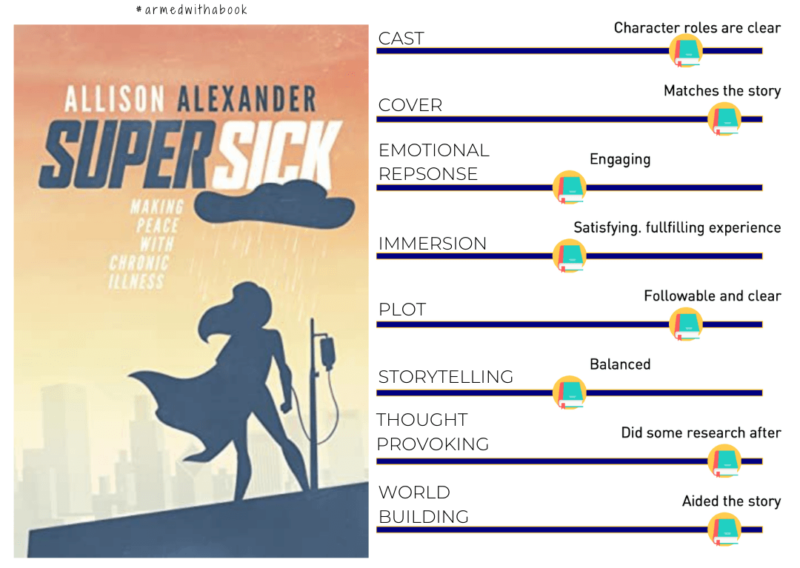How much do you know about the experience of someone who has chronic illness? How they came to have that and why do they continue to have it? Whether they are your friends or relatives, do you come from a place of compassion when you talk to them? Allison Alexanders book Super Sick: Making Peace with Chronic Illness taught me wonderful things, exposing many of my perceptions and giving meaning to my experiences with my family that has chronic illness. Take a look at the synopsis below:

Superheroes aren’t sick. This has been Allison Alexander’s observation, anyway. They don’t lie in bed all day because they’re in too much pain to get up. They don’t face the challenges of the chronically ill—difficulties that include socially inappropriate topics like mental illness, sex, and diarrhea. The latter, of course, would be exponentially worse in a spandex suit.
Alexander, who has struggled with a chronic illness since she was a child, wants to see herself in her heroes and searches for examples of sick characters in pop culture. She weaves her own painful experiences with stories from other chronic sufferers, engaging with how society values healthiness, how doctors don’t always have answers, and how faith, friendship, and romance add pressure to already complicated situations. If you’re a fan of Marvel, Harry Potter, Final Fantasy, and other stories from pop culture, you may find some familiar references inside.
Journey through sage stories as Alexander makes peace with her illness despite a culture that suggests she’s worthless unless she’s healed.
Why I chose to read Super Sick
As I mentioned in my post about pursuing our passions, I picked up Super Sick because I have been curious about this topic and my aunt has a chronic illness. Though they have different illnesses, there is still something to be learned from similar situations and sometimes, the best way to learn something that someone wont say is to read about it.
Themes for Thought
Instead of doing the usual themes for thought in depth, I will enumerate the four things I learned from this book. Some of these takeaways are things I learned about chronic illness while others relate to general strategies that I can apply to my own life.
# 1 Sometimes there is no better response than just being there.
As someone supporting my friends and family who have chronic illness, I am often at a loss for words. I don’t know what to say to them. I feel like I am not doing enough. Truth is though that it doesn’t matter how I feel – what matters is if they feel that I am doing what I can for them. Allison explains her interactions with her friends and how they have changed over time as she has prioritized herself and started owning that this is the way she feels. I loved that honesty and I hope I can remind myself that when I feel this way again.

# 2 Other people’s struggles are not supposed to make us feel better about ourselves.
I knew that. What was eye-opening though was Allison’s analysis of some famous movies like A Walk to Remember and Love Story which “use sick characters as a plot device to teach healthy people how to live fuller lives.”
A person’s inability to do something shouldn’t be a reason to feel better about ourselves. They are not less because of their illness. My aunt is a phenomenal professor who has continued to write academic papers and publish in good journals throughout her illness. Talking to her on the phone would not make anyone guess that she is in a wheelchair. I bet some people are happy to think “thank goodness that’s not me” but what maters is that she continues to do what she was doing before, things that a lot of people who are healthy do not do. She is an inspiration.
Allison is an inspiration for sharing her experiences. There are things that we just have to say sometimes for people to hear – our peers need to hear them because they probably struggle with the same things and can’t express them. Other people also need to know so that they gain a new perspective.
# 3 It is okay to not feel like doing anything.
This takeaway was enforced in my chat with Allison for my post about pursuing our passions in these stressful times. I often struggle with this, especially now when I frequently feel bored and am trying to fill my mind doing something ‘productive’. Why? Why do I feel this need to always be doing something? Self-care is sometimes doing nothing and being ok with that. Practicing meditation and mindfulness are ways to be okay with doing nothing.
Allison faces this a lot more than I do where her pains stop her from doing what she has planned. She only has so many spoons to spare for the day and some days, half a dozen spoons are dedicated to just making peace with the pain. We have our own struggles and only we know how many spoons we can spare.
# 4 I have started to notice chronic illness in stories I read.
In Super Sick, Allison introduced me to numerous characters from fiction, gaming and TV world which I did not know had chronic illness. In my time of reading this book, I started to notice such characters in the books I was reading.
- The Renegades series by Marissa Meyers has Oscar or Smokescreen who uses a a cane to walk because of a bone disease.
- The Illuminae Files has Ella Malikova: After suffering from the lysergia plague at the age of 13, she ended up paralyzed from the waist down, she is only able to move the upper part of her body. Due to her lungs being compromised, she has to wear an oxygen mask at all times.
Both are brilliant characters that I absolutely love.
Overall, Super Sick is a fantastic book that I would highly recommend if you like learning about new things and read non-fiction. Well-researched with examples from all walks of life, this book will make you think. I hope you will give this book a chance.
** Super Sick: Making Peace with Chronic Illness is now out in stores so get a copy and let me know what you think! **
Amazon Print
Amazon Kindle

One last thing: Allison is passionate about representations of disability n fiction and games. Take a look at the blog tour currently underway where she is sharing and different characters on each blog. Come back tomorrow for her post here on Raven from the 100.

Cover image: Photo by Deanna Lewis on Unsplash

Ahhhhh thank you so much for making the first review I’ve seen of my book so positive, Kriti! I’m honoured you chose to read it and got so much out of it.
It’s been a pleasure, Allison. Thank you for selecting me to be a part of your journey! I look forward to future collaborations.
I’ve been thinking of late that there should be more positive fictional characters who happen to have disabilities. Not to make these central to the story, but incidental. Such a story would need to be crafted with sensitivity and without being patronising. Food for thought.
This looks super interesting and seeing a superhero with chronic illness has put a huge smile on mu face!
Yes I love that cover and it brought a smile to my face too. 🙂